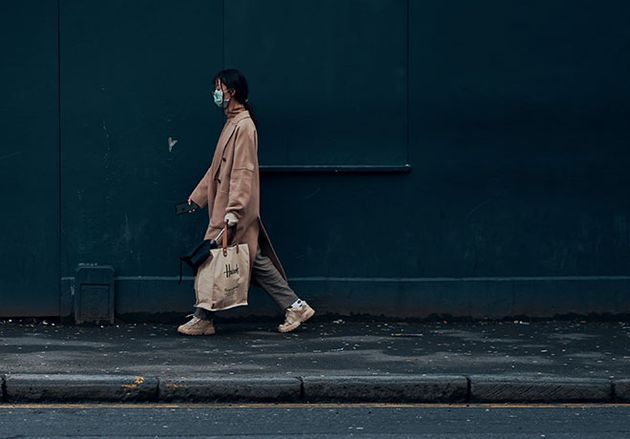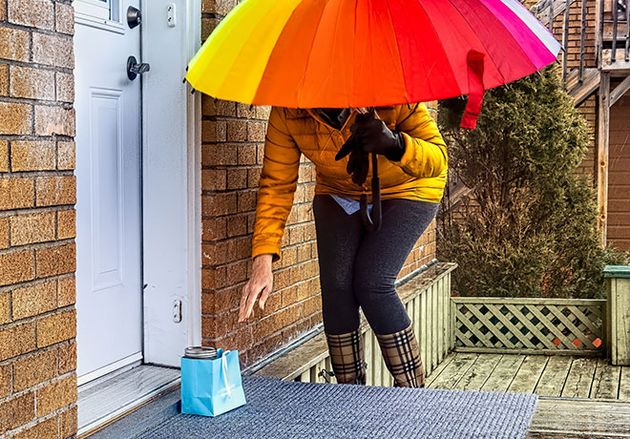Lament, communities of care and the new normal. An article by Gladys K. Mwiti.
![Photo: [link]Arto Marttinen[/link], Unsplash CC0.](https://cms.evangelicalfocus.com/upload/imagenes/6012c9b96e344_lgabuilding.jpg) Photo: [link]Arto Marttinen[/link], Unsplash CC0.
Photo: [link]Arto Marttinen[/link], Unsplash CC0.
Like a mighty storm, COVID-19 has left the world reeling and rocking with the very foundations of ‘normal’ shaken.
We shall never be the same again as we learn that pandemics are no respecter of persons, the royal or lowly, rich or poor, the aged or babes. We have been equalized, white, black, and colored, Asian, European, and African.
We have seen the underbelly of powerful nations and been reminded that we all are equal before our Creator God. We all cry with the same tears, our hearts are broken in the same way, and our worries and fears are as palpable as those near and far.
As nations face over 90 million COVID-19 infections 1 and the greatest economic recession, the whole world continues to grapple with traumatic disruptions—increasing COVID-19 deaths; tweets of health workers holding hands of dying patients as they pass on far away from family and friends; parents struggling to balance work and homeschooling, while under the stress and fear of losing their jobs; millions feeling the isolation of the lockdown and the anxiety that there is no cure or vaccine in view as yet.
‘How long?’ we wonder. COVID-19 is not the only crisis. Many countries are spiraling downwards economically, not only due to the pandemic, but also from corrupt leadership and self-centered political conniving, leaving many wondering—what next?
Traumatic incidents come suddenly and leave a trail of fear, death, and destruction.2 COVID-19 is a global pandemic, life threatening and creating much uncertainty. The result is panic, fear, isolation, anxiety, stigmatization, ‘coronaphobia’, hoarding and anger. 3
The impact is an escalation of mental health challenges and social breakdown, especially among the mentally and psychologically vulnerable—the poor, jobless, mentally-ill, depressed, and anyone already living with domestic violence and abuse.
Lockdown and quarantine have limited freedom to socialize and curtailed social supportive networks, including church life. Helplessness, hopelessness, and isolation amplify mental health and trauma challenges.4
As some battle denial and anger, others are stressed and anxious facing massive job losses as mega companies and industries collapse.
A recent meta-analysis of up to 36 heterogeneous studies covering a population of 117,044 on COVID-19 mental health impact indicates the prevalence of 29.6 percent stress, 31.9 percent anxiety, and 33.7 percent depression.5
The current concern is that as nations concentrate on controlling the spread of the virus and medical treatment for the infected, mental health needs are not receiving the required urgency. 6
We are also facing the impact of global health, with physical ailments 7such as cough, fever, fatigue, headache, diarrhea, sore throat, loss of taste or smell, as well as acute respiratory distress.
In addition, scientists argue that COVID-19 is mutating, begging the question whether the vaccines in clinical trials will catch up with the self-transforming virus. Never before have so many scientists focused on a single research topic as top laboratories labor for a breakthrough, not only for a vaccine, but for a cure as well.

[photo_footer] Ross Sneddon. / Unsplash CC0. [/photo_footer] In my book Christian Counseling, I discuss the reality of disorientation in times of trauma—where, in a world that was orderly and predictable, things suddenly became disordered and erratic. 8 At such times, many are asking questions such as: ‘Why has this happened?’; ‘Why me?’
Soon after the Rwanda genocide of 1994, our Oasis Africa team of professional trauma psychologists were among the first to enter Rwanda. In the three years of our trauma counseling program, we often faced the ‘why’ question as we all tried to understand the genocide where in 100 days, 800,000 people were killed with machetes and rifles.9
In one of our meetings, a young woman asked, ‘Where was God when my whole family and villagers died?’ As the room rang with the silence that followed, an elderly man named Bizimungu, translated ‘God sees me’, stood up and said, ‘I too have struggled for many days with that question. I have come to realize that God was always there—in each of our villages and situations, holding us and weeping with us’.
Bizimungu’s words echoed African perspectives on theodicy—a theological perspective that tries to affirm divine justice despite the suffering in the world, suffering that so often seems arbitrary and gratuitous.10 The word ‘theodicy’ was coined by the German philosopher Leibniz, and is based on two Greek words, theos or ‘God’ and dike or ‘justice’. 11
In times of suffering and trauma during this COVID-19 pandemic, God is with us as we mourn the departed and protect ourselves from the virus.
Biblical lament
In times of peril, since we know that God is with us, we can practice the discipline of lament. In the book of Psalms, David teaches us the secret of lament.
For example, in Psalms 41 and 42, we learn to openly pour our hearts to God who does not frown at our thoughts and does not expect a nicely packaged prayer from his hurting confused children.
When we know that God is with us, sees the storm we are in, and knows our pain, we can approach him with our tears, fears, and doubts. Lamenting in God’s presence is the beginning of spiritual self-care in times of crisis.
This spiritual discipline goes hand-in-hand with practicing the disciplines of prayer, Bible reading, and worship.
The practice of self-care and other care
Other practices of self-care involve physical care—sleeping well, exercise, drinking much water, eating balanced meals—and mental care. Taking care of the mind involves adapting ourselves to the new reality, especially managing isolation with thanksgiving for the simple joys that brighten our lives—the fact that we are alive, the sound of a child’s laughter, even the smell of our favorite food.
The practice of self-care and other-care involves creating community—cherishing and celebrating our relationships with family members, neighbors, relatives, and others in the community. These practices enhance resilience—our ability to bounce back into healthy living once the crisis is over. 12
With children, routine helps because children especially thrive where there is order—maintaining school hours, planning for fun creative activities, and rewarding adherence to house rules including COVID-19 prevention care.
Job loss and loss of loved ones would result in shock and confusion. Disruption of mourning rituals and funeral rites makes the loss even harder to bear. Holding on to family and faith community, celebrating the life of the departed, are part of self-care and care for those affected.

[photo_footer] Andre Ouellet. / Unsplash CC0. [/photo_footer]
The role of the church during COVID-19 13
Lockdown during COVID-19 has impacted the global church in unprecedented ways. Christians—whose lives revolve around worship gatherings, ministering, building community in small groups, meeting, and encouraging one another—were suddenly thrown into disarray.
No meetings, no ministries, no gatherings, no weddings, no Holy Communion. The church did not know and still does not know how to deal with this disorientation. The result has been termed as an ‘anaemic’ response that has left many members floundering, deprived of spiritual comfort and vivacity.
The common COVID-19 message from the church globally is: ‘We’re closed. We’ll let you know when we open again’. 14 As a community of care, besides conducting online worship and Bible study, the church should mobilize its members to care for the needy and voice a message of hope to the nation. These days, too often the only media message we hear is about numbers of the infected, the dead, and cut-throat political shenanigans.
What does God require of us? In the midst of COVID-19, God desires that we take time to understand the signs of the times, become bearers of hope, practice holistic self-care, adapt to the new normal from home to church and community, create caring communities, and learn to speak out words of total dependence on our all-knowing God. 15
‘Though the fig tree does not bud and there are no grapes on the vines, though the olive crop fails and the fields produce no food, though there are no sheep in the pen and no cattle in the stalls, yet I will rejoice in the Lord, I will be joyful in God my Savior. The Sovereign Lord is my strength; he makes my feet like the feet of a deer, he enables me to tread on the heights’ (Hab 3:17-19; NIV).
Gladys K. Mwiti, PhD, Consulting Clinical Psychologist and Trauma Specialist, is the Founder and CEO of Oasis Africa Center for Transformational Psychology and Trauma in Nairobi, Kenya.
Author of five books, numerous journal articles, and book chapters, she is immediate past Chairperson of the Kenya Psychological Association (KPA).
This article originally appeared in the January 2021 issue of the Lausanne Global Analysis and is published here with permission. To receive this free bimonthly publication from the Lausanne Movement, subscribe online at www.lausanne.org/analysis.
1. as of mid-January 2021 – for current figures, go to https://www.worldometers.info/coronavirus/?utm_campaign=homeAdvegas1?
2. A.C. McFarlane, P. Williamson, & C.A. Barton, ‘The Impact of Traumatic Stressors in Civilian Occupational Settings,’ Journal of Public Health Policy, 30, (2009): 311–27, https://doi.org/10.1057/jphp.2009.21.
3. Souvik Dubey et al., ‘Psychosocial Impact of Covid-19,’ Diabetes Metab Syndr, 14, (2020): 779-88, https://doi.org/10.1016/j.dsx.2020.05.035. ↑
4. Julio Torales et al., ‘The Outbreak of COVID-19 Coronavirus and its Impact on Global Mental Health,’ The International Journal of Social Psychiatry. Pub Med. (2020): https://doi.org/10.1177/0020764020915212.
5. Nader Salari et al., ‘ Prevalence of Stress, Anxiety, Depression Among the General Population During the COVID-19 Pandemic: a systematic review and meta-analysis,’ Global Health 16, 57 (2020): https://doi.org/10.1186/s12992-020-00589-w.
6. Editor’s note: See article entitled, ‘Kingdom Opportunities for Bridging COVID-19 Disparities’, by Stephen Ko, Paul Hudson, and Jennifer Jao in the November issue of Lausanne Global Analysis, https://www.lausanne.org/content/lga/2020-11/kingdom-opportunities-for-bridging-covid-19-disparities.
7. Chaolin Huang, C. et al., ‘Clinical Features of Patients Infected with 2019 Novel Coronavirus in Wuhan, China,’ The Lancet, (2020): https://www.thelancet.com/journals/lancet/article/PIIS0140-6736(20)30183-5/fulltext.
8. Gladys Mwiti and Al Dueck, Christian Counseling: An African Indigenous Perspective (Pasadena, CA: Fuller Seminary Press, 2006).
9. The Editors of Encyclopaedia Britannica, ‘Rwanda Genocide of 1994,’ Britannica, https://www.britannica.com/event/Rwanda-genocide-of-1994.
10. Barry Whitney, What are they Saying about God and Evil? (New York: Paulist Press, 1989).
11. Richard Swinburne, Providence and the Problem of Evil (UK: Oxford University Press, 1998).
12. Everett L. Worthington, Jr., et al., ‘Forgiveness as a Catalyst for Psychological, Physical, and Spiritual Resilience in Disasters and Crises,’ Journal of Psychology and Theology, 44, (2016): 152-65, https://doi.org/10.1177/009164711604400206.
13. Editor’s note: See article entitled, ‘Hungry for Good News in Pandemic Times’, by Carol Kingston-Smith in the September 2020 issue of Lausanne Global Analysis, https://www.lausanne.org/content/lga/2020-09/hungry-for-good-news-in-pandemic-times.
14. Ben Johnson, ‘Rev. Robert Sirico: The Church’s Anemic Response to Covid-19 Hurts Everyone,’ Action Institute, (2020): https://blog.acton.org/archives/116548-rev-robert-sirico-the-churchs-anemic-response-to-covid-19-hurts-everyone.html.
15. Editor’s note: See article entitled, ‘Building a Moveable Pulpit for Mental Health’, by Hebert Palomino in the November issue of Lausanne Global Analysis, https://www.lausanne.org/content/lga/2020-11/building-a-moveable-pulpit-for-mental-health.

Las opiniones vertidas por nuestros colaboradores se realizan a nivel personal, pudiendo coincidir o no con la postura de la dirección de Protestante Digital.
Si quieres comentar o